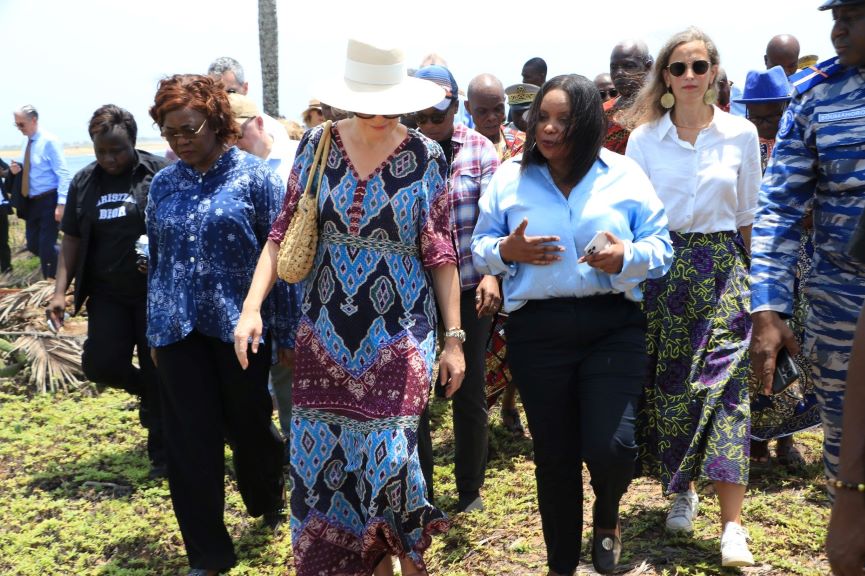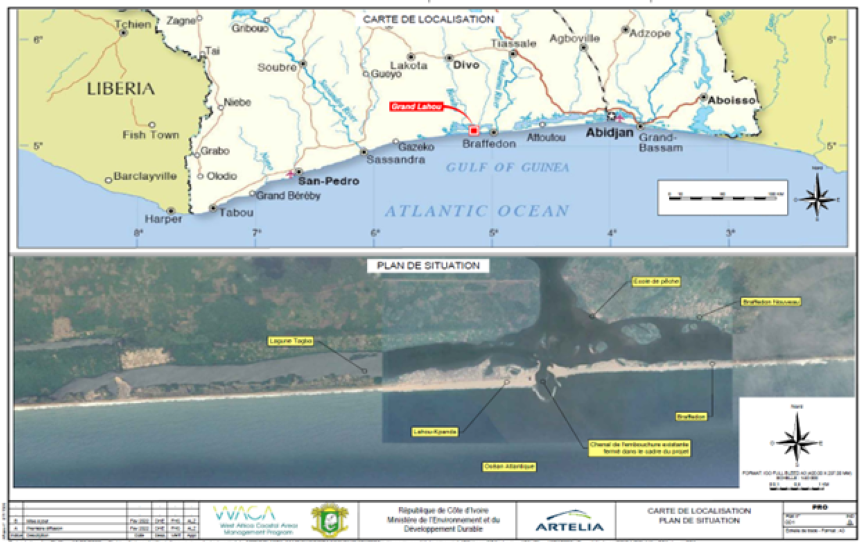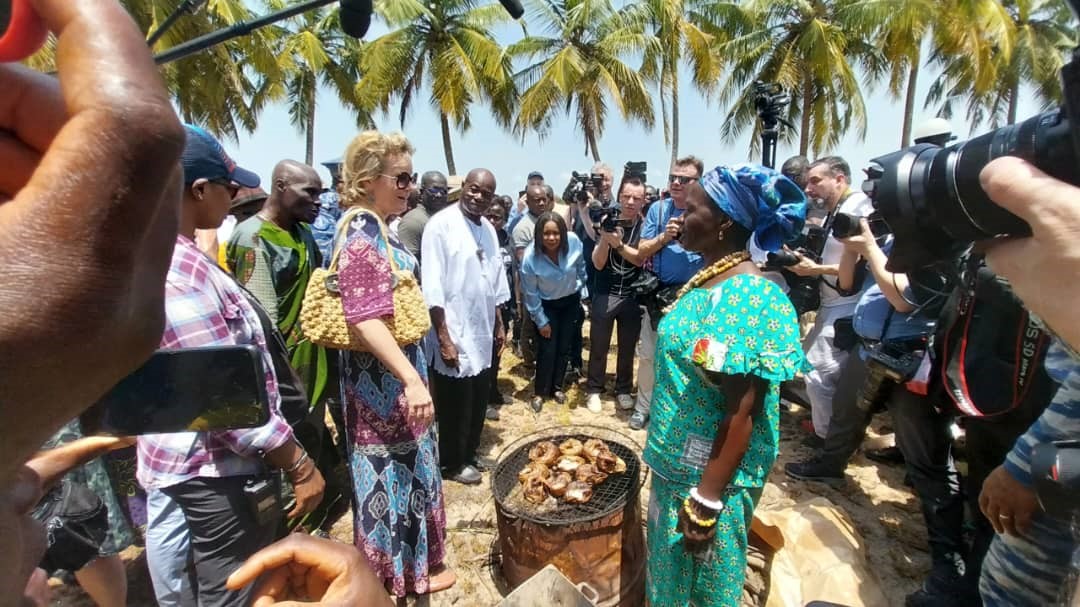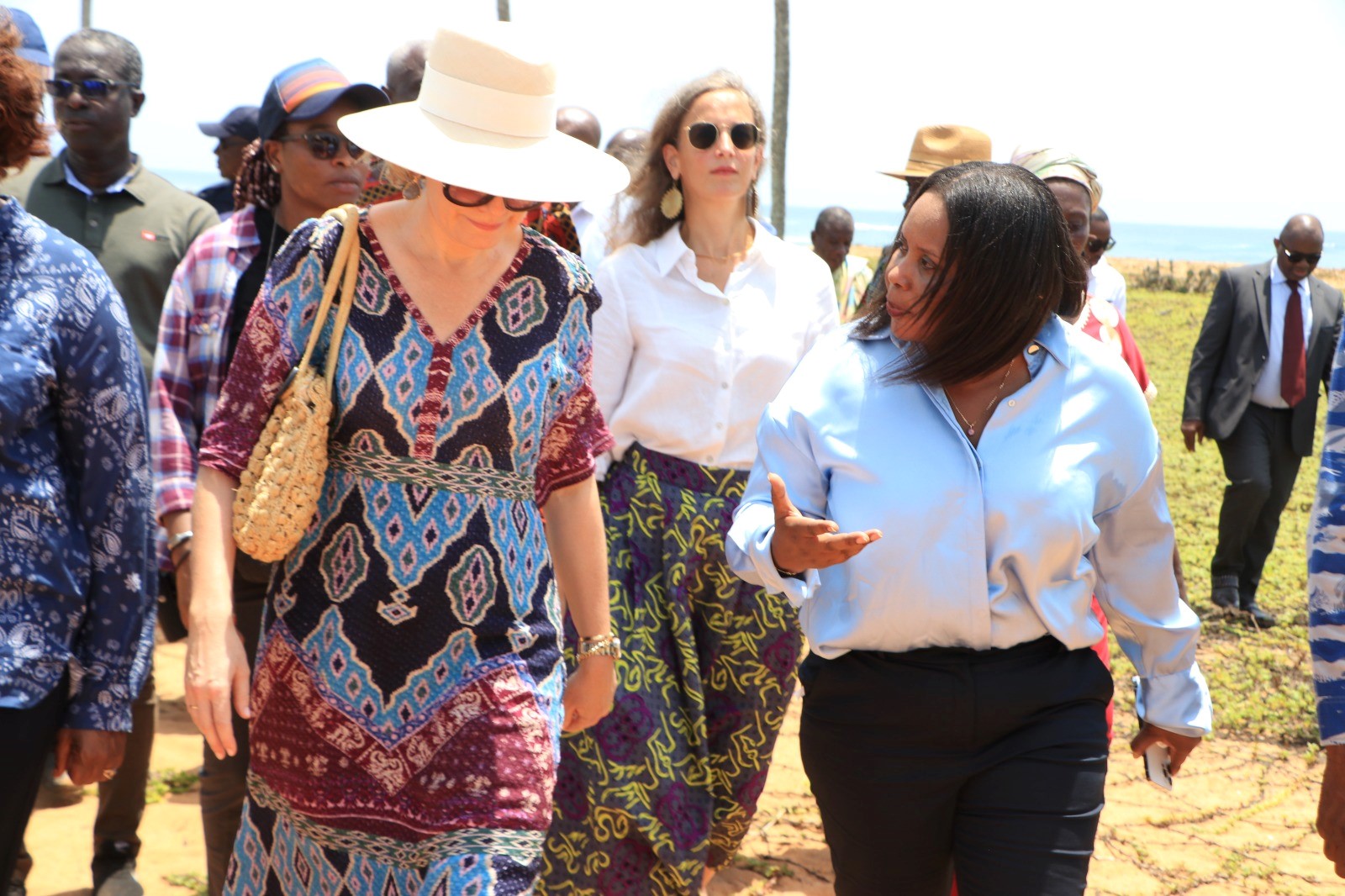Blog |
A royal visit to Grand-Lahou, Cote d’Ivoire
Her Majesty Queen Mathilde of Belgium and Ms. Marie-Chantal Uwanyiligira, Country Director, WB.
March 5, 2024. Today, Grand Lahou, Cote d’Ivoire welcomed a very special guest: Her Majesty Queen Mathilde of Belgium. As Sustainable Development Goals Advocate, she has promoted the importance of accelerating progress to build resilience, with a focus on how climate change is impacting our society. The choice of Grand-Lahou on her journey is justified, it exemplifies the intersection of the complex challenges caused by climate change and land-use along Africa’s coast. The old town of Grand-Lahou vanished decades ago due to coastal erosion and the remaining assets and homes stand fragile, threatened by recurrent floods. Here, residents lie awake at night, praying that the waves don’t take them away while they are sleeping. Each year, the coastline loses an average of 1.8 meters, making decent livelihoods a challenge.

Her Majesty Queen Mathilde’s visit puts again a spotlight on the urgency to act. In Grand-Lahou, the Bandama River flows into the lagoon which, in turn, flows into the sea. However, the opening in the coastal barrier where the water spills into the sea, migrates westward at a speed of nearly 200 meters per year, causing the destruction of properties.
Accompanied by the Honorable Kaba Niale, Minister of Economy, Planning and Development, Cote d’Ivoire and Ms. Marie-Chantal Uwanyiligira, Country Director, World Bank, Her Majesty Queen Mathilde reiterated the need to accelerate solutions to build the resilience of coastal communities.
“With 47 percent of the coastal land at risk of coastal erosion, climate change is a reality for the growing coastal population depending on nature for services like food and jobs,” said Marie-Chantal Uwanyiligira, World Bank Country Director for Cote d’Ivoire. “The World Bank and Government of Spain, through the WACA Program, are pleased to support the government and local authorities’ efforts to secure coastal areas, build communities’ resilience against climate change, and boost West Africa’s blue economy. Investing in coastal protection is not only the right thing to do, it is smart economics”.
The West Africa Coastal Areas Management (WACA) Program brings a variety of solutions to countries to manage their coastline and save sites like Grand-Lahou. Present in nine West African countries, the World Bank and its partners have provided US$ $630 million to build coastal resilience. Thanks to WACA nearly 170,000 people are now less exposed to coastal erosion and flooding. Solutions to coastal resilience are drawn from the WACA Compendium of Solutions published by the World Bank and its partners, but they require significant resources, long-term commitment, and inclusion of all partners in the solutions.
In Cote d’Ivoire, WACA has devoted US$ 69 million to coastal resilience, including about US$ 33 million from the Spanish Agency for International Development (AECID). In Grand-Lahou, one of the country’s five hotspots of coastal degradation, WACA aims to mitigate the negative impacts. Project interventions will control the lateral displacement of the opening of the lagoon to the sea by relocating the opening to its natural stable position, with a light structure to reinforce its stability; as well as reinforce the front shore of the coastal barrier with vegetation and sand replenishment to reduce the risk of submersion and rupture. The engineering solution is designed to improve navigability in the lagoon to allow fishing and socio-economic activities such as tourism. The construction is set to start in late 2024.
Nature itself offers a solution. That is why the project also finances the restoration of the mangrove ecosystem to reduce flood risks. In other coastal risk hotspots like Assinie, marine and coastal spatial planning will support the definition of inclusive and sustainable land-and-resources use.

Engaging with communities is an integral part of the solutions. During the visit, Her Majesty Queen Mathilde spoke with residents to better grasp their daily plea of resilience: Egny Gnamba, fisher, on the dwindling catch; Josephine Dapre Djezoro, fishmonger, on their struggle to find fish to smoke and sell; and elders like Joseph Nguessan Gnandjue, on losing the cemetery, guardian of their ancestral heritage, to the waves. WACA’s approach, grounded on local action and citizen engagement, has allowed communities’ involvement at different levels by producing a coastal radio with the communities, organizing the mayors of the coast into a network, building civil society’s leadership, and giving women a central role in decision-making.

Cote d’Ivoire is a biodiversity hotspot with six Ramsar sites totaling nearly 130,000 hectares including large mangroves providing environmental services to millions of people. The ecosystems supply natural resources like fish, game, timber, and medicinal plants; protect them from natural disasters; and serve as nursery for fish. Needless to say, protecting and managing this rich biodiversity remains critical to boost communities’ resilience.
